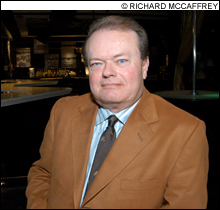Rather than doing a better job of managing nightlife, Providence tries to squelch it
 When the Congress for the New Urbanism stages a national conference in downtown Providence in June, the offerings ought to include a discussion session titled, “The Renaissance City: A Case Study in How to Not Handle Nightlife.”
When the Congress for the New Urbanism stages a national conference in downtown Providence in June, the offerings ought to include a discussion session titled, “The Renaissance City: A Case Study in How to Not Handle Nightlife.”
For at least the last six years, as more residents have moved downtown and into the adjacent Jewelry District — the combined epicenter of Providence nightlife — skirmishes have predictably ensued between the newcomers and club and bar owners. Critics assert that a small fraction of nightlife denizens go over the line of acceptable behavior, while nightlife defenders say the critics wield a suburban-style mentality. In all likelihood, there’s probably enough blame to go around.
Yet rather than working together to resolve these concerns, the two sides have settled into a highly confrontational relationship, with the likelihood of litigation hovering on the horizon. The current focal point is a series of hearings being conducted by the Providence Board of Licenses, which could result in the closing not just of Club Diesel, the 1200-person capacity Washington Street dance club, but also Lupo’s Heartbreak Hotel, which utilizes the same space and brings a wider array of musical talent to the state than any other Rhode Island venue.
Although the Providence police contend that Diesel is a trouble spot, the larger problem seems to be how thousands of bar patrons and clubgoers empty into the narrow streets of downtown and the Jewelry District after closing time on peak nights, seriously outnumbering the 25 or so police officers in the area and constraining their ability to deal with the nuisance behavior that troubles residents. As traffic backs up on the nearby streets, tempers flare, producing more noise and sometimes sparking fights.
There are progressive solutions for responding to this situation. It would take money, of course, but one way would be increasing the size of the police department to correspond with Providence’s enhanced popularity as a nightlife destination. A less costly alternative would be allowing clubs and bars (or some of them, perhaps on a rotating basis) to remain open, without additional alcohol sales, until 4 am, so that patrons would depart gradually, rather than all at once. Rather than pursuing these ideas, however, the city seems locked in a cycle of trying to squelch nightlife, bit by bit.
In 2000, after the chilling carjacking slayings of two young people, some city councilors proposed rolling back the weekend closing time for bars and clubs to 1 am — even though none of the assailants had been out on the town. After that idea faded, critics unsuccessfully targeted the under-21 crowd, an integral source for revenue for a live music venue like Lupo’s. The next effort was increased regulation of nightlife through a new licensing category — the N license — that seemed targeted against Michael Kent, the owner of Club Diesel and the Complex, the two largest dance clubs in downtown and the Jewelry District.
Now, with critics still unsatisfied, the Providence Police Department has intensified the heat on Club Diesel, asserting that the popular dance club constitutes a “disorderly house.” Depending on the outcome of its ongoing hearing process, the Board of Licenses could impose a range of sanctions, ranging from a fine to the revocation of the club’s entertainment and liquor licenses. And although the department’s approach seems to embody the concerns of groups like the Jewelry District Association and the Providence Foundation, Kent has deep enough pockets to wage a sustained fight, and he vows to take the city to court if he doesn’t like the outcome.
In many respects, the nightlife situation has changed little in the last six years. Providence deserves vibrant nightlife, and the city is safer and more interesting when more people go out at night. Using a broad brush to punish the majority of law-abiding patrons, because of the behavior of relatively few people, would be a big mistake. Most importantly, the solution should rest in doing a better job of managing the headaches that invariably come with nightlife, rather than using a neo-Prohibitionist approach.
Nightlife critics call the tune
Sounding quite reasonable, Providence Mayor David N. Cicilline talks about the nightlife situation as a matter of finding the right balance: “Ensur[ing] that Provi¬dence is a vibrant and exciting city with a diverse variety of nightlife venues and live music venues, and that the management of those businesses be done in a responsible way that ensures the health and safety of residents and visitors to the downtown.” The mayor expresses support for the concept of an 18-hour downtown — “A city that is alive for 18 hours of the day [with] res¬taurants, clubs, and pedestrian activity.”